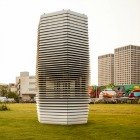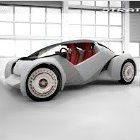Latest Technology Inventions

The latest technology invention in environmental pollution is a tower that cleans outdoor air.
The Tower is a seven-metre (23 feet) high structure that removes ultra-fine particles from the air using a patented ion-technology developed by scientists at Delft University of Technology.
According to the World Health Organization, air pollution causes the greatest environmental threat to our health.
Air pollution causes respiratory and cardiovascular disease and accounts for over 7 million premature deaths every year - and that death toll is rising at an alarming rate.

In California, where residents suffer from the worst health impacts of dirty air in the United States, air pollution causes premature death for 53,000 residents every year.
In London, England, dirty air accounts for one out of every twelve deaths.
In Delhi, India, the average life expectancy is shortened by 6.3 years due to air pollution.

China has the worst air in the world. Beijing recently recorded pollution levels that were 17 times greater than the acceptable levels recommended by the World Health Organization.
Air pollution causes 1.6 million deaths every year in China - approximately 17% of all deaths.
For most countries, the deadliest form of air pollution is a fine particle known as "PM 2.5" (particulate matter 2.5). It is so named because it is a fine particle that is only 2.5 micrometers in diameter. Unlike larger air-borne particles that settle to the ground, PM 2.5 particles can float in the air for weeks.
When you breath these particles into your lungs , they penetrate your lung tissue and get absorbed unfiltered into your blood stream - causing damage to your body.

The problem with current air pollution control systems is that they reduce but do not eliminate pollution.
Dutch innovator Daan Roosegaarde , in collaboration with ENS Technology and the Delft University of Technology, developed large scalable towers that remove pollution emitted into the air.
This technology was originally developed to remove MRSA bacteria (a type of bacteria resistant to antibiotics) from dust particles. The bacteria would spread from human to human by traveling in the air on dust. The air ionizer prevented the bacteria from spreading in this way.
Roosegaarde's Tower cleans 30,000 cubic meters of air per hour without using ozone and uses about 1,400 Watts of electricity - less than a desk-top air purifier.
Air from the area surrounding the Tower is drawn into the structure. All airborne particles receive an electric charge.
The charged particles are captured and accumulate on large collector plates that have an opposite electric charge.
The clean air is then blown from the Tower back into the environment.
 "Basically, it's like when you have a plastic balloon, and you polish it with your hand, it becomes static, electrically charged, and it attracts your hair," explains Roosegaarde.
"Basically, it's like when you have a plastic balloon, and you polish it with your hand, it becomes static, electrically charged, and it attracts your hair," explains Roosegaarde.
The invention won the German Design Award for Excellent Product Design awarded by the German Ministry for Economics and Technology.
The Tower is currently being tested in Beijing by the Chinese Ministry of Environmental Protection.
“We're working now on the calculation: how many towers do we actually need to place in a city like Beijing. It shouldn't be thousands of towers, it should be hundreds. We can make larger versions as well, the size of buildings,” says Roosegaarde.
Sources: dx.doi.org; studioroosegaarde.net; who.int; bbc.com/future; creativecommons.org
Cloud Computing
Analysts predict that the latest technology inventions in cloud computing will significantly influence how we use our computers and mobile devices.
Cloud computing is where tasks and file storage on your computer are performed and stored elsewhere.
By using an internet connection you can connect to a service that has the architecture, infrastructure and software to manage any task or storage requirement at less cost.
The advantages of cloud computing is that it eliminates the difficulty and expense of maintaining, upgrading and scaling your own computer hardware and software while increasing efficiency, speed and resources.
Your computer's processing speed, memory capacity, software applications and maintenance requirements are minimized.
You could store and access any size or type of file, play games, use or develop applications, render videos, word process, make scientific calculations, or anything you want, by simply using a smart phone.
As a comparison, let's say you had to generate your own electricity. You would need to maintain, upgrade and scale these resources as required to meet your demands. This would be expensive and time consuming.
Cloud computing could be compared to how a utility provides electricity. It has the architecture, infrastructure, applications, expertise and resources to generate this service for you. You just connect to their grid.
Microsoft, IBM and Google are some of the companies that are investing heavily into the research and development of cloud technology. Read more...Cloud Computing
Source: computer.org
3D Printed Car
 The latest technology inventions in 3d printing are rapidly changing how things are being made.
The latest technology inventions in 3d printing are rapidly changing how things are being made.
It's an emerging technology that is an alternative to the traditional tooling and machining processes used in manufacturing.
At the International Manufacturing Technology Show in Chicago, a little known Arizona-based car maker created a media sensation by manufacturing a car at the show.
It was a full scale, fully functional car that was 3d printed in 44 hours and assembled in 2 days. The video below shows the car being made.
The car is called a "Strati", Italian for layers, so named by it's automotive designer Michele Anoè because the entire structure of the car is made from layers of acrylonitrile butadiene styrene (A.B.S.) with reinforced carbon fiber into a single unit.
The average car has more than 20,000 parts but this latest technology reduces the number of parts to 40 including all the mechanical components.
“The goal here is to get the number of parts down, and to drop the tooling costs to almost zero.” said John B. Rogers Jr., chief executive of Local Motors, a Princeton and Harvard-educated U.S. Marine.
“Cars are ridiculously complex,“ he added, referring to the thousands of bits and pieces that are sourced, assembled and connected to make a vehicle.
"It's potentially a huge deal," said Jay Baron, president of the Center for Automotive Research, noting that the material science and technology used by Local Motors is derived from their partnership with the U.S. Department of Energy’s Manufacturing Demonstration Facility at the Oak Ridge National Laboratory in Oak Ridge,Tennessee.
This technology can use a variety of metal, plastic or composite materials to manufacture anything in intricate detail.
People tend to want what they want, when they want it, where they want it, and how they want it, which makes this technology disruptive in the same way digital technologies used by companies like Amazon and Apple disrupted newspaper, book and music publishers.
Imagine if you could customize and personalize your new car online and pick it up or have it delivered to you the next day at a fraction of the cost of buying one from a dealership?
What if you could make a fender for a Porsche, or a tail light for a Honda, for a fraction of the cost of buying from a parts supplier? How revolutionary would that be for the automotive industry?
It's already happening.
Jay Leno, the former Tonight Show Host and avid car enthusiast is famous for his collection of vintage automobiles.
One of the challenges with collecting antique cars is replacing parts. You can't buy them because they're obsolete and having a machinist tool the part doesn't always work and often requires costly modifications until the part fits.
So Leno uses 3d printing technology to make parts for his cars. "These incredible devices allow you to make the form you need to create almost any part", says Leno.
John B. Rogers Jr. believes that in the near future a car will be made in just 60 minutes.
The company is already organizing a worldwide network of "Microfactories" where you can order and pickup your personalized, customized car.
Sources: localmotors.com; popularmechanics.com
Vein Identification
It works by identifying the vein pattern in the palms of our hands.
Similar to our fingerprints, vein patterns are unique to each individual. The purported advantages of this technology is that it is less expensive, easier to manage, and is more reliable than traditional methods of identification.
Source: fujitsu.com
World's Fastest Motor
A new motor developed by researchers at ETH Zurich's Department of Power Electronics and marketed by the Swiss company, Celeroton, can spin in excess of 1 million revolutions per minute.
As a comparison, collapsed stars spin at 60,000 rpms, a blender at about 30,000 and high performance engines at around 10,000 rpms.
The matchbook-sized motor has a titatnium shell, ultra-thin wiring and a trade secret iron formulated cylinder. The need for smaller electronic devices requires smaller holes, which means smaller, faster, more efficient drills.
Source: celeroton.com


Your Opinion is valid .